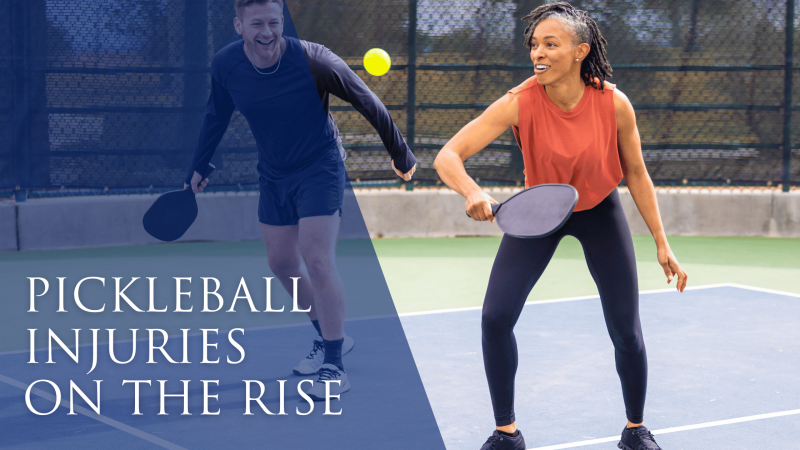Serving Up Safety: Common Pickleball Injuries and Preventing Them
![]()
 Pickleball has experienced a surge in popularity over the past few years, attracting players of all ages and fitness levels. This fast-paced sport combines elements of tennis, badminton, and ping pong, providing an exciting and social activity for players. However, like any physical activity, pickleball carries the risk of injuries. According to NBC-2.com news article by Ryan Arbogast, “The UBS study estimates that pickleball could contribute more than $377 million in healthcare costs this year, with a projected 67,000 emergency room visits, 366,000 outpatient visits, and 9,000 surgeries directly linked to pickleball-related injuries. Astonishingly, a significant 86% of ER visits related to pickleball injuries were by senior citizens. The most common types of injuries reported are sprains, strains, and fractures, accounting for 60% of all pickleball-related injuries.” Read the full article here.
Pickleball has experienced a surge in popularity over the past few years, attracting players of all ages and fitness levels. This fast-paced sport combines elements of tennis, badminton, and ping pong, providing an exciting and social activity for players. However, like any physical activity, pickleball carries the risk of injuries. According to NBC-2.com news article by Ryan Arbogast, “The UBS study estimates that pickleball could contribute more than $377 million in healthcare costs this year, with a projected 67,000 emergency room visits, 366,000 outpatient visits, and 9,000 surgeries directly linked to pickleball-related injuries. Astonishingly, a significant 86% of ER visits related to pickleball injuries were by senior citizens. The most common types of injuries reported are sprains, strains, and fractures, accounting for 60% of all pickleball-related injuries.” Read the full article here.
Dr. Brad Butkovich, Sports Medicine physician with Atlantic Orthopaedic Specialists, is seeing an increase in pickleball injuries. “It is fantastic that adults and young people alike are staying active in this growing sport. However, injuries are pervasive. I have seen and cared for ACL injuries, fractures, rotator cuff tears, and broken dislocated fingers.”
Let’s explore the most common injuries associated with pickleball and provide valuable tips to help players prevent them, ensuring the ability to enjoy the game for years to come.
Common Pickleball Injuries
Dr. Jennifer Byrd, Sports Medicine physician with AOS, is also seeing a rise in pickleball-related injuries and states, “While pickleball is relatively low impact, the sport still involves pivots, lunges, and bending. With any activity that requires sudden movements, there are risks of injury. Pickleball has exploded in popularity because it is fun, competitive, and low impact, but it doesn’t come without risk of injury! I have seen a lot of knee injuries, such as meniscal tears, from the quick pivoting and change of direction required in pickleball. If you have a knee injury with continued pain and disability, we are happy to get you a prompt appointment to be fully evaluated and treated to get you back out on the court (but out of the kitchen!) as quickly as possible!”
Some of the more common injuries in pickleball are:
- Achilles tendon injuries
Dr. Blake Moore, who specializes in Foot & Ankle, has seen numerous cases of Achilles tendon injuries this year and advises, “If you experience a sudden ‘pop’ sensation in the back of your calf while playing pickleball, accompanied by bruising, pain, and weakness when pushing off, it’s possible that you’ve ruptured your Achilles tendon. Seeking immediate medical attention from an orthopedic surgeon is crucial in such cases. While some Achilles tendon ruptures can be treated without surgery, early initiation of treatment is essential for the best possible outcome.”
- Rotator cuff injuries
- Ankle sprains
- Calf & hamstring strains
- Wrist sprains and fractures
- Knee sprains and strains
- Flares of arthritic conditions
- Tennis or “pickleball” elbow
- Lower back strain
- Shoulder impingement
Ways to Avoid Pickleball Injuries:
- Acknowledge your physical limitations: Start gradually and be mindful of your body’s signals, especially if you have existing injuries or are prone to arthritis flares. Using wrist, knee, or ankle braces can also be beneficial.
- Prioritize warming up: Develop a consistent and safe warm-up routine before playing pickleball. Spend at least 5 to 10 minutes on light jogging and stretching major muscle groups like calves, quads, hamstrings, inner thighs, lower back, shoulders, elbows, and wrists.
- Choose proper equipment: Invest in shoes specifically designed for tennis or pickleball to decrease injury risk. Unlike running shoes, tennis shoes offer better side-to-side support and optimal court traction, reducing the chances of ankle sprains and Achilles injuries. Also, using a paddle with the right handle size can lower the risk of wrist and elbow injuries with tendonitis.
- Proper form: Adopting correct form is crucial to help prevent injuries. Consider taking pickleball lessons from a professional, to learn proper techniques and footwork
- Exercise recovery: After a game, make sure to cool down by incorporating several minutes of walking and stretching post-game.
What to do if you are injured playing pickleball:
Pickleball is a sport that carries some risk of injury, especially due to falls on a hard surface, which can lead to various injuries, including fractures in areas like the shoulder, wrist, hip, knee, or ankle. For mild injuries, you can start by applying the RICE (Rest, Ice, Compression, Elevation) method and using over-the-counter pain relievers at home. However, if your symptoms persist or you suspect a more severe injury like a broken bone, it’s important you seek professional medical attention immediately. Look out for significant swelling, bruising, or limited range of motion, as they may indicate a more serious issue.
Dr. Wilford Gibson, Joint Surgeon and Specialist suggests, “If you happen to fall on your outstretched hand and it’s painful, stiff, or difficult to move, Atlantic Orthopaedic Specialists has specialty, walk-in care available at four AOS Now clinics where an exam, X-rays, and appropriate care are available.”
For hours and locations to our four orthopedic walk-in clinics in Virginia Beach, Chesapeake, and Norfolk, visit our OrthoNow page here. We are proud to be the most advanced, comprehensive orthopaedic practice in Hampton Roads, covering all eight subspecialties.






